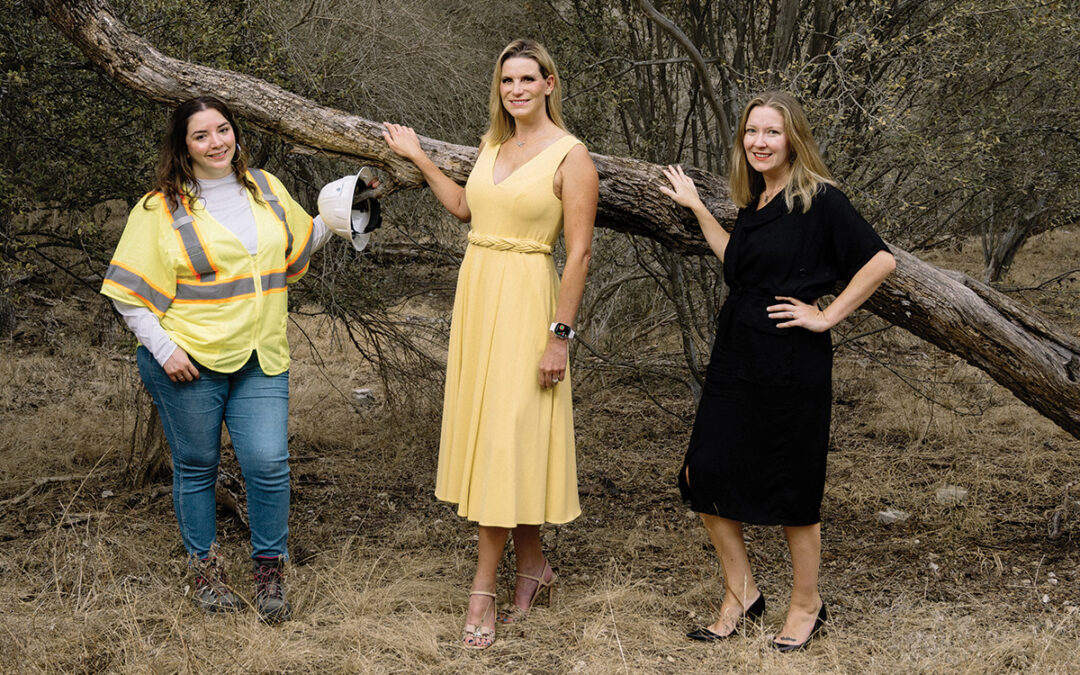THE NEEDS OF THE ARMY COMES FIRST
Tracy Dufresne’s peaceful neighborhood in north central San Antonio is worlds away from Iraq’s ravaged cityscapes, but Tracy and her 13-year-old son, Alex, have a strong emotional connection to Iraq right now. That’s because Tracy’s husband of 20 years and Alex’s father, Lt. Col. Gary Dufresne, has been deployed there since June. It’s his second tour of duty in Iraq, but his fourth overseas deployment. All that time apart has not been easy on the family. “The needs of the Army come first,” says Tracy, who spent four years as an Army nurse herself. “He is an emergency physician, and emergency physicians are sought after because they can essentially fill any other doctor’s job. This deployment is shorter than the previous one, so it’s a little better for all of us. Also, we get more phone calls and e-mails than during earlier deployments. Last night he called at 2 a.m. his time. He stayed awake to call us. When he calls, we stop everything to talk to him.” But when she recently received an evening call from a general, her reaction was less enthusiastic. Will the chaplain be showing up at my door next, she thought. Though no emergency doctors have been killed in the Near East so far, the fear of losing a loved one is always present in the minds of family members. As it turned out, the general just wanted to be kind and say hello, but she admits to lying awake at night sometimes, imagining the worst-case scenario.
As a long-time Army wife, Tracy has learned to be self-reliant both as a de facto head of household and a single parent. “I’ve been a single parent since Gary was in medical school,” she notes matter-of-factly. The two originally met as nursing students in Salem, Mass., and married in 1990 after he had already joined the Army. It was not until almost 10 years later that Gary decided to become a doctor. Though he had been deployed during Desert Storm in 1990-91 and later to Somalia, his first assignment to the current war in Iraq came a few weeks after he completed his residency at Brooke Army Medical Center. This was in November 2006, when Alex was barely 9 years old. “It was very hard for our son,” recalls Tracy. “Fortunately, his elementary school had a wonderful counselor who got a special group going for kids of divorced and deployed parents. He had an open door policy; a kid could come to his office any time to cry if he or she needed to. If they hadn’t heard from their dad in a while, he told them to come to talk. We wouldn’t have made it without that counselor.” For herself, Tracy found support among colleagues at the Start Center for Cancer Care, where she worked at the time. During her husband’s 15-month deployment, mother and son developed their own routines, becoming each other’s helpers and developing a very close relationship in the process. “When Gary came back, he was different,” says Tracy. ”He was very short-tempered and easily aggravated, which he wasn’t before. He especially had a short fuse when it came to our son. We had issues over that. One time he was really upset with Alex over what I thought was an unimportant thing. I guess he was used to total obedience from the soldiers. I had to tell him, ‘He is not your soldier.’ Integration into family life was tough. I was surprised at how tough it was.”
Soldiers are “checked” upon returning to the United States, she adds, but afterward they are left to their own devices. “Nobody calls to ask how you are doing,” she says. Gary spoke very little about his time overseas, and his wife was reluctant to press him. “He was so on edge that I did not want to make it worse,” she notes. Occasionally, though, she and the other wives would find out about the dangers their spouses were in when the guys talked among themselves. What was worse than the edginess, though, was dealing with Gary’s feeling that he was no longer needed by his family. “I was surprised by what he said, things like, ‘You don’t need me here. Maybe I should go back to Iraq,’” recalls Tracy. “He likes the fact that I am independent, but it’s a double-edged sword. You know, where does he fit in?” After much “walking on eggshells,” the spouses eventually adjusted to each other again as Gary gradually calmed down. But by the time that happened, he was off to war again. Though President Obama announced the withdrawal of combat troops from Iraq, hostilities continue and emergency physicians are still needed. Because they keep in touch more than before, the spouses discuss a lot of ordinary things and try to make decisions together. She asks him where to take the car for a checkup or mentions that she must take Alex to the doctor because of a football injury, always careful, however, not to cause Gary additional stress.
While Tracy admits to being apprehensive about his return in a few months, she is also missing her husband and making plans for their reunion.
“I’ll throw a party to celebrate his promotion (to lieutenant colonel) at Tost on Blanco. We got to know the owner fairly well, and we like that place. We’ll have a late Christmas with him; in military life, you learn to celebrate the holidays when you are all together. For spring break, we’ll have a vacation in Florida…” muses Tracy. Suddenly she is almost bubbly. But then she adds, “I’ve been driving his car. I don’t want to give it up!” We both laugh at that before she brings up something else. Once before, Gary surprised her by showing up sooner than expected, and the first thing that Tracy could think of was, “Darn it, I didn’t shave my legs.” This time, she will be prepared: “I’ll be shaving my legs for a week before (his projected arrival date).”
NO RE-ENTRY BLUES
While Jennifer Christen was dating her future husband, now Maj. Eugene Christen, she hardly thought about the dangerous side of military life. The two had met through an online dating service and had hit it off right from the first date. Although he was dispatched to foreign countries several times during their courtship, Jennifer didn’t worry. “Honestly, I didn’t think about it,” she says. “Oh, yeah, bad stuff can happen, but I loved him and nothing else mattered. These days, people think about this stuff all the time.” Her own outlook started to change when Gene was notified in June 2008 that he would be sent to Afghanistan in a few months. By now the parents of two young kids, the Christens had to figure out a lot of things before his departure. High on the list was drawing a will. “It was tough for Gene to write a will at age 37,” says Jennifer, a vivacious 35-year-old who could pass for a college student. “It was a very emotional time with a lot of crying at first. I also did a lot of praying, and I talked to other women whose husbands were deployed, especially about taking up the role of single parent. Because the children were so young, we just told them that Daddy had to go away for a while because of his job.”
By then, their mom had become well aware of the hazards of war, especially the one her husband was being sent to as a nurse attached to Special Forces. Afghanistan is worse than Iraq these days, she says; you are in danger all the time. In fact, several of Gene’s friends were injured during his time there. To cope, Jennifer isolated herself from daily news reports and moved her family back to Maryland to live with her parents. She also bonded with other military wives at Fort Campbell, Ky., burning the phone lines whenever one of them had news from her spouse. The warriors would never tell them specifics about their movements, just that they were going out on a mission. For Gene, who worked in a combat support hospital, missions meant retrieving and providing emergency care to wounded comrades from the battlefields, an inherently dangerous enterprise. To help her son and daughter remember Daddy, Jennifer, who has a degree in early childhood education, ordered two Daddy Dolls supplied free of charge by the nonprofit Operation Hug-A-Hero. The dolls are small pillows with a head-to-toe photo of Daddy in uniform printed on each and a voice recording hidden inside. “Oh, they loved this thing,” says Jennifer while showing us one of the pillows. “They slept with their Daddy Dolls and continue to do so.”
For her little boy, who was only 2 when his father left, every man in uniform became “Daddy.” On one occasion, he ran to hug a total stranger, happily shouting, “Daddy, Daddy!” His mother apologized and explained, but she was also saddened by the incident. Six months before Daddy was due to return, Mom came up with another consoling idea. She and the kids made a long chain-link streamer out of construction paper and hung it all around the living room. Each link represented a day. Every night, before going to bed, the children would tear off a link making the “waiting” chain shorter by a day. At first, the youngsters were rather overwhelmed by the length of the streamer, but as they got closer to the end, they “thought it was really cool.” In addition, she kept showing them Dad’s pictures and talking about him. As a result, when Gene came back after 15 months, his daughter had no trouble recognizing him in the crowd of uniformed men who disembarked from a bus and marched solemnly inside the military hangar where the families were assembled to welcome them. Neither child had any issues with who-is-this-man-in-our-house as their father plunged right into the swing of things. One of those things was a visit to McDonald’s to get a big Mac, another, the simple pleasure of sleeping without rockets and planes flying over his head.
To Jennifer’s surprise, she and Gene also picked up where they left off. “I was thinking we might need to go to counseling, but no, we never had to,” she says cheerfully. “It was like he was never gone, no awkward transition; he jumped right back into our life together. I can’t even imagine what he’s been through. I’ve talked to other women whose husbands suffer from post-traumatic stress disorder, but not mine. My husband is amazing; he’s such a strong man.” Has she ever worried that he might not come back? we ask, recalling her youthful insouciance about war. “Yes, that was hard, but I tried not to dwell on it too much. I kept myself very busy. Nights were the hardest, though. It helped that we could talk almost every day, so I knew he was OK,” she says. The Christen family now lives in the residential area of Fort Sam Houston while Gene is working at BAMC. Happy being a mom and enjoying life in San Antonio, Jennifer hopes Gene won’t be deployed again in his remaining five years in the military, especially not to Afghanistan. ”I don’t think this is a winnable war,” she says thoughtfully. “Afghanistan is so unstable; it’s like beating a dead horse, for lack of a better word. Our soldiers are being killed. We have a friend who lost her husband. It’s time to get our soldiers back home.”
MARRIAGE CAN BE A WAR CASUALTY, TOO
Maria Mengrone greets us at the front entrance of Sam Houston High School, and we walk together through the nearly deserted building to her math classroom on the second floor. Thick calculus books sit on the colorful desks, and there’s a fancy, computer-connected Smart-board on one wall that’s a far cry from the old-style chalkboards. A teacher can use it to display whatever is on her computer screen, but she can still write on it as on an ordinary board. Rather impressive.
But we are not here to talk math with her, much less new school technology. Though she blends just fine in the school environment, Maria is not exactly your regular math teacher. She is, in fact, 1st Lt. Maria Mengrone, a former Marine and now a Texas National Guard member, who was twice deployed to Iraq in the last six years. The first call to arms came at the most inopportune moment in her life. “I had an 11-month-old son at the time, and I had to leave him behind. I also had two older children who were 8 and 6,” she says in a calm voice that doesn’t betray the anxiety that she must have felt back then. “Since you join the military, you know you may be called to go into combat situations, but when it actually happens, it’s overwhelming. Suddenly you realize it’s no longer training. It’s real now. I was a little excited, but there was fear, too.”
While preparing to deploy, she had to write a painful letter to each of her children that started with “If you are reading this, Mom did not make it.” These letters are left with the military for safekeeping to be delivered to family members in case of a soldier’s death. “I was writing them with tissues in hand. It was the hardest thing I had to do — to essentially accept my mortality,” she notes. Research shows that kids feel more abandoned when it is the mother who leaves since mothers are still the nurturers-in-chief. Maria felt guilty leaving even though she was not exactly going on vacation. Her journey to Iraq started with several months at Fort Stewart in Georgia for extra training, followed by a month in Kuwait for yet more “weapons training” before a bunch of vehicles convoyed to Baghdad. During her nearly two years there, she worked in the public affairs office as an administrator but also ventured outside with combat units as a sort of “embedded” reporter to take pictures and file reports. She witnessed suicide bombings and an attack on the Post Exchange, the latter a place where she could have been shopping herself that day. One person died, while many more were injured. It was unnerving, to say the least.
Although she did her best on the job and “wasn’t miserable,” the nearly two-year separation from the family took a toll on everybody. When Maria got back, she found a toddler who didn’t want her to hug him and a husband she could no longer relate to. “He did OK by the kids, but it was stressful for him to have the sole responsibility for three children,” explains Maria. “When we talked on the phone (during her deployment), it was like whose lot was worse. We were not helping each other, we were complaining. After my return, we tried to go back to what we had, but it didn’t work, and we eventually divorced.” Her Iraq experience influenced her decision to dissolve the marriage. She came back a changed person, determined not to let things just happen to her. From now on, she would make conscious choices regarding the course of her life. Having faced the perils of war, Maria tackled her interrupted math studies at UTSA with new vigor, graduated in 2007 and proceeded to enroll in officer school, which she also successfully completed. These were heady accomplishments for a girl who only a few years before had worked in a dead-end job at Kmart and had no idea what to do with her life. But then the reality of war intruded again. She was ordered back to Iraq.
Only this time, the newly minted officer went as a platoon leader in charge of 40 soldiers. Her previous public affairs work seemed tame compared to her new assignment: overseeing prison facilities with some 350 hostile detainees — “the worst of the lot” — who were not accustomed to seeing a woman in such a position. Her platoon’s job was to train Iraqi guards to take over the care of the prison while also teaching them to respect the detainees’ human rights. According to a military blog called You Served, it was because of herstrong leadership that the camp she oversaw, Camp Taji, became the first prison to be officially turned over to the Iraqi government. To become effective as a female officer, the lieutenant had to prove herself, first with her own soldiers and then with the prisoners as well. They all eventually fell in line. “I succeeded by being firm and not wavering,” she explains. “Detainees try to manipulate you. You have to stay firm for what is the right thing to do. It wasn’t easy; every single day was stressful.” Still, witnessing firsthand the Iraqis’ progress toward taking charge of their own affairs was most rewarding.
Back in the States, however, the brave warrior experienced culture shock all over again. Like Gary Dufresne, she had gotten used to the efficiency of giving orders and hearing the “yes, ma’am” responses. With her kids, she was back in the land of “you want me to do what?” articulated in that special way youngsters adopt when they would rather not hear you. But she doesn’t mind too much. “I am glad that they are letting me be Mom again,” she admits. More troubling are the anxiety attacks that still plague her, sometimes when her students get too rowdy in class. Talking about it is therapeutic, though, and time will take care of the rest, she hopes.
Before parting, we ask her one last question: If she had to do it all over, would she enlist again?
“In a New York minute,” she quips.









0 Comments